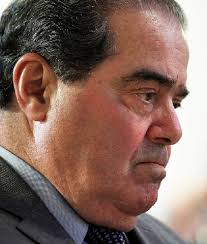
The late Justice Antonin Scalia
Scalia was the leading proponent of what he termed “textual originalism” in constitutional cases. By this he meant to convince the world that, as a judge, he was merely a passive cypher or conduit for the original intent of the Framers. If a judge had to interpret something in the Constitution, he or she should embrace a strict dictionary definition and not try to divine what Madison, Hamilton and the rest may have had in mind but for whatever reason didn’t write into the document. If the Framers wanted the Constitution to mean something, they should have said so. Scalia and the so-called originalists claim that theirs is the only “objective” way of reading the Constitution. Moreover, the dictionary you go by should be contemporaneous with the part of the Constitution you’re working on. Thus, under Scalia’s approach, you’ll need the 1789 version of Webster’s (or its equivalent, if Webster wasn’t born yet). Likewise, grab hold of the 1866 version for the post-Civil War amendments, and so on.
Originalism is a complete canard. Neither Scalia nor any of the remaining four right wing jurists now on that bench genuinely believe that “originalism” somehow limits their ability to construe the Constitution. To the contrary, they depart from “originalism” at will, and then try to bend it backwards to explain their result-oriented decisions.
The most insightful disassembly of Scalia’s sham originalism is Posner’s article, The Incoherence of Antonin Scalia, For example, Posner cites a case in which Scalia voted to hold unconstitutional a federal law making the burning of the American flag unlawful. But as Posner points out, the First Amendment guarantees freedom of speech. Speech in 1789, meant speech, talk, tongue-wagging. No mention is made of non-verbal “speech,” and under Scalia’s announced principles, if the Framers meant to protect non-verbal speech they should have said so. Posner goes on to completely destroy the notion of “originalism” in reference to the landmark case of Brown v. Board of Education, for which no textual support exists in the Constitution.
Wayne LaPierre and the gun lobby would be quite surprised if Scalia’s textual orginalism were applied to the Second Amendment. By “arms” the Framers could only have understood the type of gun used by Leonardo DeCaprio in his new early wilderness flick, Revenant: muzzle-loading, black powder affairs that could fire one shot. Not only that, but once you pull the trigger on one of those babies, it takes another half-second or so before the bullet actually blasts out of the muzzle. Compared to modern guns, that’s an eternity. Then you have to put the damn thing down and reload it.
If Scalia really believed his own nonsense, perhaps we would have no controversies about assault rifles and high-capacity magazines. Such things were unknown to the Framers, and accordingly there would be no constitutional right to own them. There’s an advantage in that, though. If textual originalists meant what they said, nut-cases like Jared Lee Loughner would probably have caused far fewer fatalities.
But consistency is merely the hobgoblin of non-originalist minds.
Perhaps now Scalia and originalism can take their rightful place, right next to Derrida and deconstructionism, in the Encyclopedia of Piffle.
Read Full Post »

